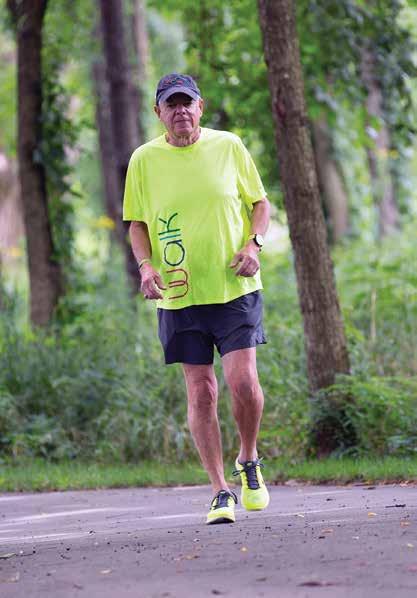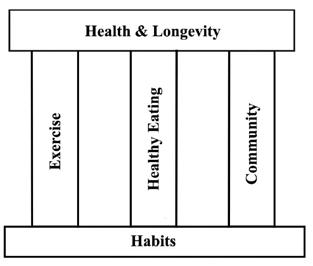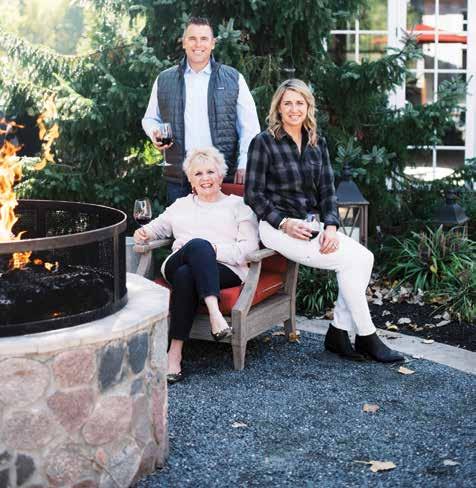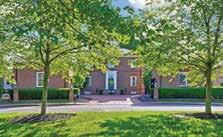
5 minute read
On The Path
Mindful Medicine
Deepak Chopra kicks off Season 10 of the New Albany Lecture Series
The 10th anniversary season of the New Albany Lecture Series begins Oct. 18 with a talk on Health and Well-Being by Deepak Chopra. The bestselling author and pioneer in integrative medicine opens the 2022-23 slate of experts and thought leaders.
“Just come with an open attitude,” Chopra says, “and I hope you go back inspired to make at least one or two changes that lead to a more joyful, healthier and happier life.”
Chopra is an endocrinologist by medical trade, and became well-known for his efforts in introducing Ayurvedic medicine and meditation to the West.
He hosts three podcasts and has written more than 90 books on a range of topics. His company has created a meditation and well-being app and offers master classes, coaching certifications and retreats. The Chopra Foundation, a nonprofit founded in 2001, has a mission to advance the cause of mind/ body spiritual healing, education and research.
At 75, though in what he considers to be perfect health, Chopra says he’s looking forward to his final chapter and final phase in life.
Chopra is driven by his passion to make the world a better place.
“My passion is to help the world if I can move into more peace, social and economic and gender justice, and economic and social justice, sustainability, health, and joy,” he says. “I like to think of those things and cherish them, but right now, my dominant interest is what is called knowing or getting closer to truth beyond the perceptual set we call reality.”
East to West
Chopra emigrated from India to the U.S. in 1970 at the age of 23 to complete a residency in internal medicine and endocrinology. He made meditation a part of his life during the beginning of his career in medicine after growing up watching his mother practice it.
“During my fellowship, I got interested because of my training in endocrinology. Also, by then, I personally was experiencing a lot of stress as a resident and a doctor, and smoking and drinking alcohol and all of that,” he says. “I needed to take care of myself and I needed to take care of my patients. So a long time ago, 1980, I just started to switch

Deepak Chopra on food
“I believe that a diet that has maximum diversity of plant-based foods is the healthiest. If you eat meat or animal protein, if it doesn’t come from a factory, and it comes farm to table, that influences 90 percent or more of the genetic information is the body. Less than 5 percent of disease-related gene mutations are fully penetrant in that they guarantee the disease. More than 95 percent of disease – chronic illness including cancer, heart disease, autoimmune illness – is epigenetically modifiable.
“So the future of well-being is preventable, precise and personalized. It requires your participation. It’s a process, but you can influence it through lifestyle, including diet but also sleep, stress management, emotions, relationships, biological rhythms and ultimately what we call reducing inflammation in the body, which is connected to everything, including depression and anxiety.”
my lifestyle and also expand my way of treating patients.”
In 1980, Chopra was made chief of staff at the Boston Regional Medical Center (formerly known as New England Memorial Hospital). He discovered transcendental meditation, which helped him quit smoking and drinking.
Quantum Healing: Exploring the Frontiers of Mind/Body Medicine was Chopra’s first book, published in 1989. He combined Western medical science, Hindu observations and poetry to argue


Deepak Chopra speaks during a retreat at the Chopra Center in California.
that meditation, clean living and changing the way one views the world allow one to harness the intelligence of the body, which he posits can keep aging and disease at bay.
In 1993, he wrote Ageless Body, Timeless Mind: The Quantum Alternative to Growing Old, which garnered the attention of Oprah Winfrey and cemented Chopra’s career and place in the New Age movement.
Chopra says his process for his work is to ask himself questions before meditation and sleep. He writes down ideas and notes and those musings end up as his books.
Tending to combine both Eastern and Western philosophies in his teachings and writings on medical science, quantum physics, health, aging, perspective, the nature of reality and more, Chopra has received his fair share of criticisms and skepticism alongside his best-selling book sales.
“It’s not always easy to make correlations between Western systems of thought and Eastern philosophy systems of thought, or even modalities of treatment, because they come from two different categories of modes of knowing and experience,” he says. “Sometimes mixing the two of them, which I’ve done, creates what it called category confusion. Fortunately, endocrinology is the least subject to category confusion, because it deals with both what’s happening in the brain and what’s happening in the mind.”
For Chopra, integrative medicine is about taking into account almost every factor that could contribute to a person’s health. That includes the body, mind, emotions and intellectual understanding, as well as personal relationships and social interactions. Furthermore, he says, food, sleep, stress management, diet, biological rhythms and spiritual realization are all important facets to examine in determining and maintaining well-being.
He says his biggest influence was his mother, who was a great storyteller, singer and very spiritual person.
“And then my second biggest influence was my father, who was also a physician and a cardiologist and an adventurer. And then the Indian philosopher J. Krishnamurti,” he says.
But right now?
“Right now, I would say my own inner silence is my biggest influencer,” Chopra says.
The Lecture Series takes place at the Jeanne B. McCoy Community Center for the Arts. Tickets are on sale now. Claire Miller is editor at CityScene Media Group. Feedback is welcome at cmiller@cityscenemediagroup.com.
Oct. 18 Heath & Well-Being Deepak Chopra, M.D. Jan. 23, 2023 Social Justice Maria Ressa
Feb. 16 History Bret Baier
March 8 Civil Discourse and Debate Dr. Arthur Laffer and Robert Reich Moderated by Rana Foroohar June 6 National Security Gen. John F. Kelly and Adm. James Stavridis Moderated by Jim Sciutto










